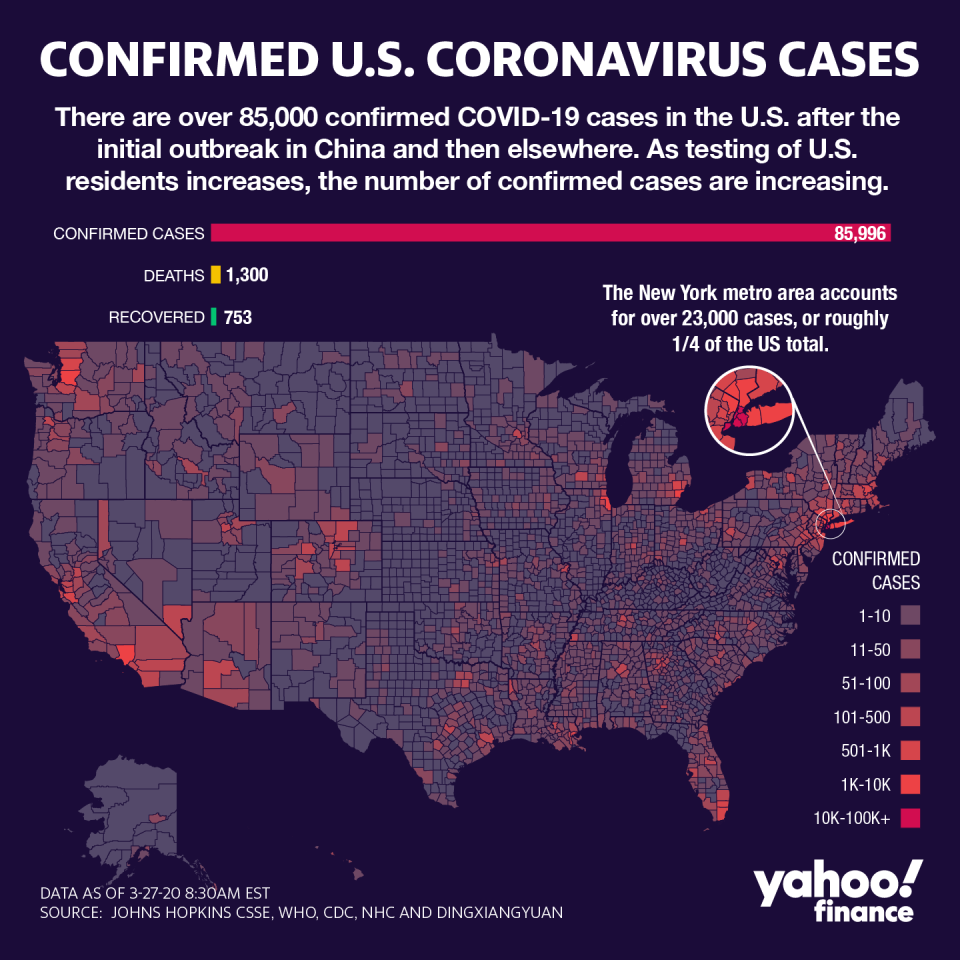Trump is begging for an Election Day recession
Reopen the economy, virus be damned. This is President Trump’s latest pivot as he tries to figure out what it means to be a “wartime president.”
Like everybody, Trump is growing impatient as nearly half the country stays home and thousands of businesses shut down. He keeps saying he wants to “reopen” the economy by Easter, which is April 12. But the coronavirus spread hasn’t been contained anywhere in the country, and we could have quadruple as many cases by then. Or more. Yet a chorus of conservatives is now saying, so what, open things up anyway.
The idea is to ease up on areas that have low infection rates, as if low infection rates are locked in place and can’t go up. Texas’s Republican Lt. Gov., Dan Patrick, suggested recently that some coronavirus deaths among seniors might be a tolerable price to pay to restart the economy and spare others the despair of economic hardship. Trump himself has argued that the recession we’re plunging into will lead to “massive depression, where people commit suicide, where tremendous death happens.” There are deaths with coronavirus, and deaths without coronavirus, see? Wouldn’t you rather have deaths with a functioning economy than with a moribund one?
There’s a crucial fallacy in this argument, which assumes that a president “reopening” the economy would put everything back to normal, even if the virus is rampant. Nothing of the sort would happen. Mayors and governors wouldn’t go along with the president if it meant letting the virus metastasize on their turf. Businesses wouldn’t reopen with the potential liability of knowingly infecting customers and employees. Ordinary people wouldn’t go out, either. Many (though not all) are smart enough to tell when their elected officials are lying to them and putting them at higher risk than necessary.

‘A double-dip recession’
Beyond that, a mistimed effort to restart the economy too soon could backfire, prolonging the recession or even triggering a phantom recovery followed by another downturn, as the virus reasserted itself and everybody had to retreat all over again. “The risk is if you do it prematurely and get another wave of this, then instead of getting a U shaped recovery, you get a W,” Ryan Sweet, director of real-time economics at Moody’s Analytics, tells Yahoo Finance. “The economy could bounce back but then we’d go right back to closing non-essential businesses again and you get a double-dip recession.”
With luck, the recession we’ve plunged into will be severe but short, with businesses coming back online by summer as social distancing begins to work and widespread testing becomes available. Even that won’t be easy. Economists and public-health officials alike argue for the most aggressive shutdown possible now, to contain the virus once and for all.
With a vaccine likely a year away, aggressive testing is essential to determining who has the virus and who doesn’t. Yet the United States isn’t close to that yet, with only about 600,000 tests conducted so far. That’s the most in the world, yet it’s just one test for every 550 Americans, and it’s far lower than the per capita testing rate in South Korea, which has begun to corral the virus. It’s possible a successful testing regime could require multiple tests per person, at least in high infection areas, to determine who’s safe to move around and who must stay home.
Trump is obviously aware that the coronavirus recession threatens his reelection bid, since no incumbent president in modern times has won a second term with a recession to answer for during his first. If Trump were to continue and expand federal guidance for aggressive shutdowns now—lasting perhaps another two or three months—he might luck out and be able to point to an economic recovery by fall. If he flinches and persuades some areas of the country to ignore the virus and continue business as usual, he’ll have to explain away an open ended viral scourge and a recession with no end in sight. This virus demands payment now, or a much higher payment later.
Rick Newman is the author of four books, including “Rebounders: How Winners Pivot from Setback to Success.” Follow him on Twitter: @rickjnewman. Confidential tip line: rickjnewman@yahoo.com. Encrypted communication available. Click here to get Rick’s stories by email.
Read more:
Follow Yahoo Finance on Twitter, Facebook, Instagram, Flipboard, SmartNews, LinkedIn, YouTube, and reddit.


